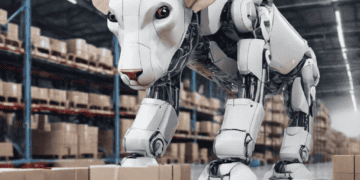Supply chains around the world have faced challenges, with unpredictable shortages, shipping delays, and logistical disruptions. However, these difficulties present an opportunity for businesses to gain a competitive edge. Advanced analytics driven by artificial intelligence (AI) offer a solution to enhance supply chain resilience.
In recent times, there has been significant discussion about AI tools like Chat GPT and Dall-E, which can generate text and images in response to prompts. While these systems have potential value, it’s essential to consider associated risks. At the same time, there are low-risk use cases of “pragmatic AI” that can help organizations adapt to real-world supply chain volatility. These applications can improve real-time operational analytics and simulations, optimize routes, manage materials quality, and enhance the quality of trading partner data.
Every organization faces unique supply chain challenges, but there are three AI-based best practices that can benefit all:
1. Establish a Supply Chain Center of Excellence (COE) with a Focus on Pragmatic AI:
- Executive leadership recognizes the importance of supply chain agility, and a COE with executive sponsorship enables technical and business leaders to collaboratively address supply chain risks.
- Ensure the COE emphasizes practical AI applications, such as automated route optimization, anomaly detection in parts manufacturing, and prescriptive demand planning.
2. Enhance Trading Partner Data Management with AI:
- In complex supply chain processes, many tasks are delegated to suppliers, requiring high collaboration and near-real-time data exchange.
- Use practical AI applications to automate the use of trading partners’ data, such as product test results, shipping data, and bill of materials, to expedite data quality improvements.
3. Assess and Improve Supply Chain Maturity with AI:
- A Supply Chain COE can establish a baseline for three facets of supply chain maturity: dynamic learning, data curation and automation, real-time operational analytics and simulation, and scalability and diffusion of innovation.
- Adopt a phased approach to implement AI:
- Integrate AI data quality processes into existing enterprise resource planning (ERP) and supply chain management (SCM) infrastructure and applications.
- Utilize AI for predictive and prescriptive analytics to reduce operational risk.
- Develop AI-driven dashboards for real-time visibility sharing with trading partners.
Brembo SpA, a global leader in automotive disc brake technology, operates in 15 countries across three continents. With 29 production sites and a supply chain encompassing over 6,700 businesses, the company adapted analytics workflows to enhance supply chain intelligence. By focusing on improving analytics for big data, Brembo improved its analytics infrastructure, setting the stage for AI-infused insights that support supply chain agility.
The turbulence in supply chains is expected to persist, making it an opportunity to enhance agility. While generative AI garners media attention, the practical use of AI can transform supply chain fragility into a competitive advantage.
Stay current with supply chain report news at The Supply Chain Report. For international trade resources, visit ADAMftd.com.
#SupplyChainResilience #AIinSupplyChain #AIforBusiness #SupplyChainAgility #PragmaticAI #AdvancedAnalytics #AIinLogistics #SupplyChainOptimization #DataDrivenSupplyChain #PredictiveAnalytics #SupplyChainCenterOfExcellence #AIforOperations #TradingPartnerData #SupplyChainMaturity #AIforInnovation #Brembo #SupplyChainLeadership #ArtificialIntelligence #AutomotiveSupplyChain #BremboSpA















